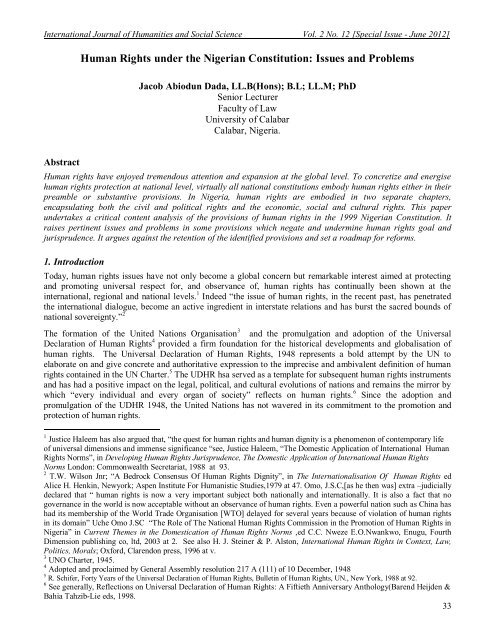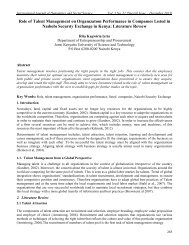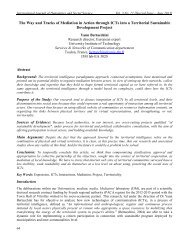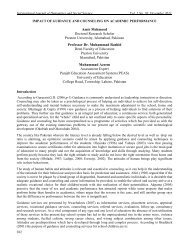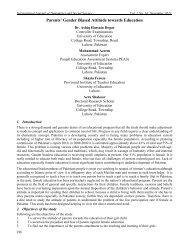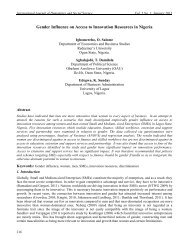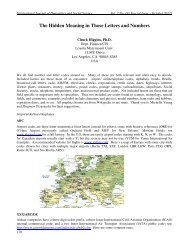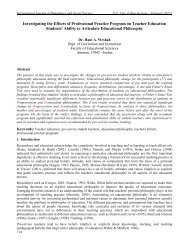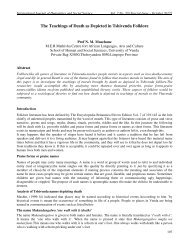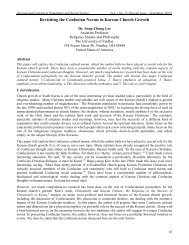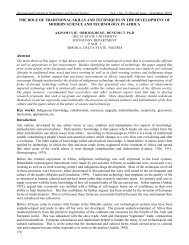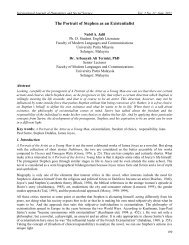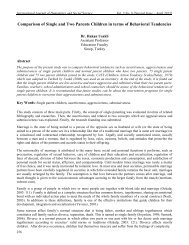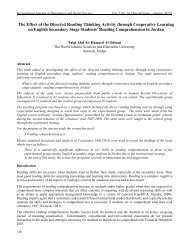Human Rights under the Nigerian Constitution - International ...
Human Rights under the Nigerian Constitution - International ...
Human Rights under the Nigerian Constitution - International ...
Create successful ePaper yourself
Turn your PDF publications into a flip-book with our unique Google optimized e-Paper software.
<strong>International</strong> Journal of <strong>Human</strong>ities and Social Science Vol. 2 No. 12 [Special Issue - June 2012]<br />
<strong>Human</strong> <strong>Rights</strong> <strong>under</strong> <strong>the</strong> <strong>Nigerian</strong> <strong>Constitution</strong>: Issues and Problems<br />
Jacob Abiodun Dada, LL.B(Hons); B.L; LL.M; PhD<br />
Senior Lecturer<br />
Faculty of Law<br />
University of Calabar<br />
Calabar, Nigeria.<br />
Abstract<br />
<strong>Human</strong> rights have enjoyed tremendous attention and expansion at <strong>the</strong> global level. To concretize and energise<br />
human rights protection at national level, virtually all national constitutions embody human rights ei<strong>the</strong>r in <strong>the</strong>ir<br />
preamble or substantive provisions. In Nigeria, human rights are embodied in two separate chapters,<br />
encapsulating both <strong>the</strong> civil and political rights and <strong>the</strong> economic, social and cultural rights. This paper<br />
<strong>under</strong>takes a critical content analysis of <strong>the</strong> provisions of human rights in <strong>the</strong> 1999 <strong>Nigerian</strong> <strong>Constitution</strong>. It<br />
raises pertinent issues and problems in some provisions which negate and <strong>under</strong>mine human rights goal and<br />
jurisprudence. It argues against <strong>the</strong> retention of <strong>the</strong> identified provisions and set a roadmap for reforms.<br />
1. Introduction<br />
Today, human rights issues have not only become a global concern but remarkable interest aimed at protecting<br />
and promoting universal respect for, and observance of, human rights has continually been shown at <strong>the</strong><br />
international, regional and national levels. 1 Indeed “<strong>the</strong> issue of human rights, in <strong>the</strong> recent past, has penetrated<br />
<strong>the</strong> international dialogue, become an active ingredient in interstate relations and has burst <strong>the</strong> sacred bounds of<br />
national sovereignty.” 2<br />
The formation of <strong>the</strong> United Nations Organisation 3 and <strong>the</strong> promulgation and adoption of <strong>the</strong> Universal<br />
Declaration of <strong>Human</strong> <strong>Rights</strong> 4 provided a firm foundation for <strong>the</strong> historical developments and globalisation of<br />
human rights. The Universal Declaration of <strong>Human</strong> <strong>Rights</strong>, 1948 represents a bold attempt by <strong>the</strong> UN to<br />
elaborate on and give concrete and authoritative expression to <strong>the</strong> imprecise and ambivalent definition of human<br />
rights contained in <strong>the</strong> UN Charter. 5 The UDHR hsa served as a template for subsequent human rights instruments<br />
and has had a positive impact on <strong>the</strong> legal, political, and cultural evolutions of nations and remains <strong>the</strong> mirror by<br />
which “every individual and every organ of society” reflects on human rights. 6 Since <strong>the</strong> adoption and<br />
promulgation of <strong>the</strong> UDHR 1948, <strong>the</strong> United Nations has not wavered in its commitment to <strong>the</strong> promotion and<br />
protection of human rights.<br />
1 Justice Haleem has also argued that, “<strong>the</strong> quest for human rights and human dignity is a phenomenon of contemporary life<br />
of universal dimensions and immense significance “see, Justice Haleem, “The Domestic Application of <strong>International</strong> <strong>Human</strong><br />
<strong>Rights</strong> Norms”, in Developing <strong>Human</strong> <strong>Rights</strong> Jurisprudence, The Domestic Application of <strong>International</strong> <strong>Human</strong> <strong>Rights</strong><br />
Norms London: Commonwealth Secretariat, 1988 at 93.<br />
2 T.W. Wilson Jnr; “A Bedrock Consensus Of <strong>Human</strong> <strong>Rights</strong> Dignity”, in The <strong>International</strong>isation Of <strong>Human</strong> <strong>Rights</strong> ed<br />
Alice H. Henkin, Newyork; Aspen Institute For <strong>Human</strong>istic Studies,1979 at 47. Omo, J.S.C,[as he <strong>the</strong>n was] extra –judicially<br />
declared that “ human rights is now a very important subject both nationally and internationally. It is also a fact that no<br />
governance in <strong>the</strong> world is now acceptable without an observance of human rights. Even a powerful nation such as China has<br />
had its membership of <strong>the</strong> World Trade Organisation [WTO] delayed for several years because of violation of human rights<br />
in its domain” Uche Omo J.SC “The Role of The National <strong>Human</strong> <strong>Rights</strong> Commission in <strong>the</strong> Promotion of <strong>Human</strong> <strong>Rights</strong> in<br />
Nigeria” in Current Themes in <strong>the</strong> Domestication of <strong>Human</strong> <strong>Rights</strong> Norms ,ed C.C. Nweze E.O.Nwankwo, Enugu, Fourth<br />
Dimension publishing co, ltd, 2003 at 2. See also H. J. Steiner & P. Alston, <strong>International</strong> <strong>Human</strong> <strong>Rights</strong> in Context, Law,<br />
Politics, Morals; Oxford, Clarendon press, 1996 at v.<br />
3 UNO Charter, 1945.<br />
4 Adopted and proclaimed by General Assembly resolution 217 A (111) of 10 December, 1948<br />
5 R. Schifer, Forty Years of <strong>the</strong> Universal Declaration of <strong>Human</strong> <strong>Rights</strong>, Bulletin of <strong>Human</strong> <strong>Rights</strong>, UN., New York, 1988 at 92.<br />
6 See generally, Reflections on Universal Declaration of <strong>Human</strong> <strong>Rights</strong>: A Fiftieth Anniversary Anthology(Barend Heijden &<br />
Bahia Tahzib-Lie eds, 1998.<br />
33
The Special Issue on <strong>Human</strong>ities and Behavioral Science<br />
© Centre for Promoting Ideas, USA<br />
This explains <strong>the</strong> subsequent numerous resolutions, declarations 7 and conventions 8 which have been passed in <strong>the</strong><br />
area of human rights. So important is <strong>the</strong> issue of human rights that virtually all constitutions, <strong>the</strong> world over,<br />
make provisions for human rights ei<strong>the</strong>r in <strong>the</strong> preamble or in <strong>the</strong> substantive provisions. 9 In Africa for instance,<br />
except for Tanzania, where reference to human right 10 is to be found in <strong>the</strong> preamble to <strong>the</strong> constitution, and<br />
Malawi 11 where human rights provisions embodied in substantive provisions of <strong>the</strong> independence constitution<br />
were replaced by generalised references to human rights in <strong>the</strong> “Fundamental Principles of Government” section<br />
on <strong>the</strong> adoption of <strong>the</strong> Republican <strong>Constitution</strong> of 1966, most African constitutions include in <strong>the</strong>ir substantive<br />
sections provisions for human rights. 12<br />
In <strong>Nigerian</strong> <strong>Constitution</strong>s, beginning from <strong>the</strong> post-independence constitution, due attention has always been<br />
given to <strong>the</strong> issue of human rights. In <strong>the</strong> 1960 independence <strong>Constitution</strong>, 13 1963 Republican <strong>Constitution</strong> 14 and<br />
1979 <strong>Constitution</strong>, 15 provisions were made for human rights protection. Fur<strong>the</strong>r, in <strong>the</strong> 1999 <strong>Constitution</strong> (as<br />
amended) two Chapters, 16 spanning 26 (twenty six) sections are devoted to human rights subject. 17 The need for<br />
constitutional provisions for human rights cannot be over-emphasised because, it is <strong>the</strong> state, with its various<br />
institutions which is primarily responsible for guaranteeing <strong>the</strong> implementation and enforcement of <strong>the</strong>se rights in<br />
respect of its citizens and all those coming <strong>under</strong> its jurisdiction. 18<br />
Often, <strong>the</strong> primary institutions, <strong>the</strong> legislature, <strong>the</strong> executive and <strong>the</strong> judiciary are set up in <strong>the</strong> constitution. 19<br />
Indeed, it has been observed that: “any protection system presupposed recognition of human rights in <strong>the</strong> basic<br />
texts which reflect <strong>the</strong> constitution of each state. When incorporated in <strong>the</strong> highest –ranking national legal<br />
instrument, human rights and <strong>the</strong> principles governing <strong>the</strong>m enjoy <strong>the</strong> greatest authority and security in both <strong>the</strong>ir<br />
definition and <strong>the</strong>ir guaranteed observance”. 20<br />
7 Some of <strong>the</strong> Declaration are, Declaration on <strong>the</strong> Elimination of All forms of Intolerance and Discrimination Based on<br />
Religion or Belief, adopted 25 Nov. 1981. G.A. Res 36/55, 36 UN GAOR, Supp (No. 5+) UNDOC. A/36/51 at 171 1981;<br />
Declaration on <strong>the</strong> Elimination of violence Against Women adopted 20 th Dec, 1993 GA Res 48/104, UNDOC. A/48/29;<br />
Declaration on <strong>the</strong> Right of Child, adopted 20 Nov. 1959, GA Res 1386 (XIV), 14 UN GAOR, Supp. (No. 16) UN Doc.<br />
A/4334 at 19(1959) Declaration on <strong>the</strong> Right to Development, adopted 4 Dec, 1986, GA Res 41/28.<br />
8 Notable Conventions which have been passed by <strong>the</strong> United Nations include, The <strong>International</strong> Convention on <strong>the</strong><br />
Prevention of <strong>the</strong> Crime of Genocide; <strong>the</strong> <strong>International</strong> Convention on <strong>the</strong> Elimination of All Forms of Racial<br />
Discrimination., The <strong>International</strong> Convention Relating to <strong>the</strong> Status of Refugees, <strong>the</strong> Convention Against Torture and o<strong>the</strong>r<br />
Cruel, Inhuman and Degrading Treatment or Punishment; The Convention on <strong>the</strong> Right of <strong>the</strong> Child; <strong>the</strong> Convention<br />
Concerning <strong>the</strong> Abolition of Forced Labour. The Convention on <strong>the</strong> Political <strong>Rights</strong> of Women; The Convention on The<br />
Nationality <strong>Rights</strong> of Women; Convention on <strong>the</strong> prevention and punishment of <strong>the</strong> Crime of Genocide, etc.<br />
9 For example, <strong>the</strong> French <strong>Constitution</strong> of 1958 refers in its preamble to <strong>the</strong> 1789 Declaration of <strong>the</strong> Right of man and of <strong>the</strong><br />
citizen. Most newly independent countries refer directly to, or even incorporate, basic international texts‟ such as <strong>the</strong><br />
Universal Declaration of <strong>Human</strong> <strong>Rights</strong>, 1948. This is true of <strong>the</strong> <strong>Nigerian</strong> <strong>Constitution</strong> and Indian <strong>Constitution</strong>. Part 111 of<br />
Indian <strong>Constitution</strong> incorporated virtually all <strong>the</strong> rights contained in UDHR. See, Jean –Bernard Marie, „National Systems<br />
for <strong>the</strong> Protection of <strong>Human</strong> <strong>Rights</strong>‟ in <strong>Human</strong> <strong>Rights</strong> <strong>International</strong> Protection, Monitoring, Enforcement, Januz Symonides<br />
ed. Aldershot Hants: Ashgate, UNESCO Publishing, 2003 at 258.<br />
10 See Interim <strong>Constitution</strong> of Tanzania, 1965 as amended by An Act to amend <strong>the</strong> Interim <strong>Constitution</strong> of Tanzania, Act No.<br />
8 of 1975.<br />
11 See James S. Read, „Bills of <strong>Rights</strong> in The Third World‟, Some Commonwealth Experiences, Verfasung and Recht in<br />
Ubersee, H. Kruger (ed) 1 Heft 1 Quartal, 1973 at 21.<br />
12 O.C. Eze; <strong>Human</strong> <strong>Rights</strong> in Africa, Some Selected Problems, Lagos; <strong>Nigerian</strong> Institute of <strong>International</strong> Affairs, 1984 at P.<br />
27.<br />
13 Chapter ii, 1960 <strong>Constitution</strong><br />
14 Chapter ii, 1963 <strong>Constitution</strong> from section 18 to 40<br />
15 Chapter iv, 1979 <strong>Constitution</strong> from section 30 to 39<br />
16 That is chapters 2 and 4, 1999 <strong>Constitution</strong>. Although <strong>the</strong> provisions of chapter 2 dealing with fundamental objective and<br />
directive principles of state policy are not justiciable, <strong>the</strong>y are none<strong>the</strong>less not without any utilitarian value as <strong>the</strong>y serve as<br />
aid to interpretation of <strong>the</strong> o<strong>the</strong>r sections.<br />
17 These provisions are virtually, a verbatim et literatim reproduction of <strong>the</strong> 1979 <strong>Constitution</strong>, The 1963 <strong>Constitution</strong><br />
however had no provisions comparable with chapter 2 of <strong>the</strong> 1979 and 1999 <strong>Constitution</strong>s; but made provisions for human<br />
rights in sections 18 to 33.<br />
18 Jean -Bernard Marie, op‟ cit. at 257.<br />
19 In Nigeria for instance, sections 4,5 and 6 of <strong>the</strong> 1999 <strong>Constitution</strong> make provisions for <strong>the</strong>se organs of government.<br />
20 Jean-Benard Marie, op. cit. at 258.<br />
34
<strong>International</strong> Journal of <strong>Human</strong>ities and Social Science Vol. 2 No. 12 [Special Issue - June 2012]<br />
The protection of human rights in any national constitution is a recognition and part fulfilment of <strong>the</strong> international<br />
obligation of <strong>the</strong> State to take joint and separate action in cooperation with <strong>the</strong> UN for <strong>the</strong> achievement of<br />
universal respect for, and observance of, human rights and fundamental freedoms. 21 While <strong>the</strong> need for <strong>the</strong><br />
guarantee and protection of human rights in national constitutions cannot be doubted, it is important to do a<br />
critical content-analysis of <strong>the</strong>se constitutional provisions with a view to seeing <strong>the</strong>ir real value against <strong>the</strong><br />
concept of universality, interrelatedness and interdependence of human rights. The primary role of this paper<br />
<strong>the</strong>refore is to examine to what extent <strong>the</strong> provisions of <strong>the</strong> constitution on human rights energize, invigorate, and<br />
galvanise human rights goals in Nigeria? Essentially, it is proposed to examine salient issues and problems in <strong>the</strong><br />
extant <strong>Nigerian</strong> constitution which, arguably, deconstruct or <strong>under</strong>mine traditional human rights jurisprudence<br />
and goal. In <strong>the</strong> first part of this paper, it is proposed to skeletally examine <strong>Nigerian</strong>‟s <strong>Constitution</strong>al development<br />
as it relates to human rights. The second part will be devoted to <strong>the</strong> examination of <strong>the</strong> provisions of <strong>the</strong><br />
constitution guaranteeing human rights. Part three will deal with <strong>the</strong> issues and problems in human rights<br />
provisions of <strong>the</strong> <strong>Constitution</strong>. It is to be noted that reference to <strong>the</strong> <strong>Nigerian</strong> <strong>Constitution</strong> unless o<strong>the</strong>rwise<br />
specifically stated is reference to <strong>the</strong> 1999 <strong>Constitution</strong> as amended since that is <strong>the</strong> current Nigeria <strong>Constitution</strong>.<br />
Part 1<br />
Brief <strong>Constitution</strong>al History<br />
Before Nigeria attained nationhood in 1960 and was consequently admitted as <strong>the</strong> 100 th member of <strong>the</strong> United<br />
Nations, it passed through a series of constitutional developments. Professor Ajomo 22 captured Nigeria‟s<br />
constitutional development as follows:<br />
“Since <strong>the</strong> emergence of <strong>the</strong> geographical entity known as Nigeria, it has had several<br />
constitutions introduced into its legal archives. Some of <strong>the</strong>se were foisted on her by<br />
<strong>the</strong> colonial government while o<strong>the</strong>rs were fashioned out with <strong>the</strong> participation of<br />
diverse interests in Nigeria...<br />
The <strong>Constitution</strong>s operated in Nigeria prior to independence were designed to achieve specific political objectives<br />
of <strong>the</strong> colonialists without any formal or conscious attempt by <strong>the</strong> colonial government to safeguard human rights<br />
in its entirety. This could not have been o<strong>the</strong>rwise as colonialism was anti<strong>the</strong>tical to human rights protection.<br />
Although pre-independence <strong>Constitution</strong>s did not specifically guarantee human rights promotion and protection, it<br />
is significant to note that successive pre-independence constitutional conferences dating back to 1953 recognised<br />
and advocated <strong>the</strong> need for <strong>the</strong> inclusion of certain fundamental rights in <strong>the</strong> future constitution. Yet, <strong>the</strong> eventual<br />
adoption of a bill of right by Nigeria in its Independence <strong>Constitution</strong> in 1960 was informed by and predicated on<br />
<strong>the</strong> need to allay <strong>the</strong> fear of domination of <strong>the</strong> over 100 ethnic nationalities by <strong>the</strong> three major tribes. 23 Ajomo<br />
succinctly made <strong>the</strong> foregoing point as follow:<br />
[T]he heterogeneous nature of <strong>the</strong> country was <strong>the</strong> factor that led to <strong>the</strong> inclusion of <strong>the</strong> tenets<br />
of human rights in our constitutions. This resulted from <strong>the</strong> fears of minorities for <strong>the</strong>ir<br />
development in a country that was gradually marching to self determination. 24<br />
The inclusion of a bill of right in <strong>the</strong> Independence <strong>Constitution</strong>, 1960 was not only important but remarkable<br />
because it was a departure from <strong>the</strong> position adopted by Britain, Nigeria‟s colonial master which at <strong>the</strong> time as<br />
now did not have a bill of rights as such.<br />
According to Professor Nwabueze, 25 <strong>the</strong> absence of a Bill of right in Britain serves to ensure that “liberty is not<br />
legally protected against British Parliament” Ra<strong>the</strong>r, <strong>the</strong> individual is protected from <strong>the</strong> infractions of his liberty<br />
by <strong>the</strong> executive.<br />
21 The Charter of <strong>the</strong> United Nations, Articles 55 and 56.<br />
22 M.A. Ajomo,” <strong>Human</strong> <strong>Rights</strong> <strong>under</strong> <strong>the</strong> <strong>Nigerian</strong> <strong>Constitution</strong>s” in Democracy and <strong>the</strong> Law, Y. Osinbajo & A. Kalu, eds;<br />
Eagos: Federal Ministry of Justice Law Review Series, 1991 at 106-107.<br />
23 Ajomo, op. cit. at 109<br />
24 Ibid. In 1958, a Royal Commission headed by Sir Henry Willink was appointed to investigate <strong>the</strong> problems of <strong>the</strong><br />
minorities. The Committee observed that one solution to <strong>the</strong> fears of minority groups would be <strong>the</strong> provision of a scheme of<br />
fundamental human rights in <strong>the</strong> <strong>Constitution</strong>, fashioned after <strong>the</strong> European Convention for <strong>the</strong> Protection of <strong>Human</strong> <strong>Rights</strong>:<br />
For a fuller account, See, T.O. Elias Nigeria; The Development of its Laws and <strong>Constitution</strong>s, Stevens, 1967 at 142.<br />
25 B.O. Nwabueze, <strong>Constitution</strong>al History of Nigeria, London: Longman, 1962 at 120.<br />
35
The Special Issue on <strong>Human</strong>ities and Behavioral Science<br />
© Centre for Promoting Ideas, USA<br />
It is significant to note that, since <strong>the</strong> introduction of a bill of right in <strong>the</strong> Independence <strong>Constitution</strong> in 1960,<br />
subsequent <strong>Constitution</strong>s, starting with <strong>the</strong> Republican <strong>Constitution</strong>, 1963 to <strong>the</strong> 1979 <strong>Constitution</strong>, have not<br />
failed to incorporate <strong>the</strong>se rights in <strong>the</strong>ir provisions. 26 Thus, it has been observed that:<br />
in spite of <strong>the</strong> traumatic experiences of <strong>the</strong> political crises, including <strong>the</strong> period of civil<br />
war of 1967 to 1970, <strong>the</strong> rights have remained <strong>the</strong> same” i.e <strong>the</strong>y have not been<br />
extinguished by any regime be it military or civilian. That does not mean that <strong>the</strong>y have<br />
not been assaulted and threatened; <strong>the</strong> truth is that <strong>the</strong>y have remained in our statute books<br />
ever since even if for cosmetic purposes.<br />
From <strong>the</strong> foregoing historical sketch, it becomes clear that human rights have always commanded a<br />
pride of place in <strong>the</strong> <strong>Nigerian</strong> constitutions. Never<strong>the</strong>less, it is imperative to examine <strong>the</strong> content of<br />
human rights in <strong>the</strong> extant constitution.<br />
Part II<br />
<strong>Constitution</strong>al Provisions on <strong>Human</strong> <strong>Rights</strong>.<br />
It can be rightly asserted that one of <strong>the</strong> greatest objectives of <strong>the</strong> post independence <strong>Nigerian</strong> <strong>Constitution</strong>s is <strong>the</strong><br />
protection and promotion of human rights. The preamble to <strong>the</strong> 1999 <strong>Constitution</strong> unmistakably set <strong>the</strong> tone 27 by<br />
dedicating itself to promote “good government and welfare of all persons on <strong>the</strong> principles of freedom, equality<br />
and Justice”. Apart from <strong>the</strong> preamble, chapters two and four of <strong>the</strong> <strong>Constitution</strong> extensively deal with human<br />
rights issues. While chapter two is captioned, Fundamental Objectives and Directive Principles of State Policy,<br />
chapter four is entitled, “fundamental rights”. Under <strong>the</strong> Fundamental Objective and Direct Principles of State<br />
Policy, <strong>the</strong> second generation rights, consisting of economic, social and cultural rights are extensively set out in<br />
sections 13 to 21. These rights are predicated on <strong>the</strong> necessity for <strong>the</strong> material well-being of <strong>the</strong> citizenry with <strong>the</strong><br />
state playing a pivotal role. These rights which are essentially equalitarian and egalitarian in character are rooted<br />
on <strong>the</strong> belief that <strong>the</strong> attainment of certain level of social and economic standard is a necessary condition for <strong>the</strong><br />
enjoyment of <strong>the</strong> civil and political rights. Accordingly, <strong>the</strong>se rights require affirmative governmental action for<br />
<strong>the</strong>ir enjoyment. 28 It is not considered imperative to discuss or set out <strong>the</strong> full text of <strong>the</strong> rights guaranteed <strong>under</strong><br />
<strong>the</strong> Chapter. Accordingly, <strong>the</strong> rights will merely be spotlighted. First however, it is significant to note that <strong>the</strong><br />
obligation of <strong>the</strong> state towards <strong>the</strong> effectuation and realization of <strong>the</strong> rights is fully captured by section 13 which<br />
provides that:<br />
It shall be <strong>the</strong> duty and responsibility of all organs of government, and of all<br />
authorities and persons exercising legislative, executive or judicial powers, to<br />
conform to, observe and apply <strong>the</strong> provisions of, (<strong>the</strong> fundamental objectives and<br />
Directive Principles of State Policy).<br />
In Attorney-General of Ondo State vs. Attorney-General of <strong>the</strong> Federation & 35 ors., 29 <strong>the</strong> Supreme Court held<br />
that <strong>the</strong> foregoing section does not only impose a solemn duty to observe <strong>the</strong> mandate contained in Chapter two<br />
on all organs of government and all authorities and persons exercising legislative, executive or judicial powers,<br />
but also on private individuals as well. The court rejected <strong>the</strong> argument that <strong>the</strong> section applies only to<br />
government officials and held that <strong>the</strong> argument “does not take account of <strong>the</strong> undeniable fact that those organs do<br />
not operate entirely within <strong>the</strong>ir official cocoons. They do not, in performance of <strong>the</strong>ir duties act in isolation of<br />
<strong>the</strong> public”. 30<br />
The first fundamental objective enacted in chapter 2 is <strong>the</strong> political objective which is that Nigeria shall be a state<br />
based on <strong>the</strong> principles of democracy and social justice. 31 An important section to <strong>the</strong> present exercise is section<br />
16, which entrenches <strong>the</strong> economic objectives of <strong>the</strong> nation.<br />
26 M.A. Ajomo, „Fundamental <strong>Human</strong> <strong>Rights</strong> <strong>under</strong> <strong>the</strong> <strong>Nigerian</strong> <strong>Constitution</strong>‟, in Perspectives on <strong>Human</strong> <strong>Rights</strong>, A.U. Kalu<br />
& Y. Osinbajo eds; Lagos : Federal Ministry of Justice Law Review Series vol. 12. 1992 at 79.<br />
27 Comparable declarations existed in both <strong>the</strong> 1963 and 1978 <strong>Constitution</strong>s.<br />
28 For fur<strong>the</strong>r reading, see, K.Kartasshkin, “Economic, Social and Cultural <strong>Rights</strong>” in The <strong>International</strong> Dimensions of<br />
<strong>Human</strong> <strong>Rights</strong>, K. Vasak (ed) UNESCO, Paris Greenwood press, Westport Connecticut, 1982 at 111-133.<br />
29 (2002)9 NWLR (pt 772)222 S.C., See especially <strong>the</strong> judgment of Uwaifo, J.S.C. at 381.<br />
30 Ibid at 381, per Uwaifo J.SC<br />
31 Sections 14 and 15.<br />
36
<strong>International</strong> Journal of <strong>Human</strong>ities and Social Science Vol. 2 No. 12 [Special Issue - June 2012]<br />
It guarantees, among o<strong>the</strong>rs, <strong>the</strong> right to any person to participate and engage in any economic activities, subject<br />
to necessary restrictions, and obliges <strong>the</strong> government to protect <strong>the</strong> right of every citizen to engage in any<br />
economic activities outside <strong>the</strong> major sectors of <strong>the</strong> economy. The section fur<strong>the</strong>r provides that <strong>the</strong> state shall<br />
direct its policy towards ensuring; among o<strong>the</strong>rs – “that suitable and adequate shelter, suitable and adequate food,<br />
reasonable national minimum living wage, old age care and pensions, and unemployment, sick benefits and<br />
welfare of <strong>the</strong> disabled are provided for all citizens.”<br />
By Section 17, <strong>the</strong> state is obliged to “direct its policy towards ensuring that all citizens, without discrimination<br />
whatsoever have <strong>the</strong> opportunity for securing adequate means of livelihood as well as adequate opportunity to<br />
secure suitable employment. Fur<strong>the</strong>r, <strong>the</strong> state is obliged to ensure that <strong>the</strong> conditions of work are just and<br />
humane and that <strong>the</strong>re are adequate facilities for leisure and for social, religious and cultural life and that <strong>the</strong><br />
health, safety and welfare of all persons in employment are safeguarded and not endangered or abused.<br />
Government policy is also required to ensure that <strong>the</strong>re are adequate medical and health facilities for all persons<br />
and that <strong>the</strong>re is equal pay for equal work without discrimination on account of sex, or on any o<strong>the</strong>r ground<br />
whatsoever. By section 18, Government is obliged to direct its policy towards ensuring that <strong>the</strong>re are equal and<br />
adequate educational opportunities at all levels and Government shall as and when practicable provide free,<br />
compulsory and universal primary education, free university education and free adult literacy programme.<br />
Section 21 which deals with cultural rights provides that <strong>the</strong> state shall protect, preserve and promote <strong>the</strong><br />
<strong>Nigerian</strong> cultures which enhance human dignity and are consistent with <strong>the</strong> fundamental objectives provided for<br />
in <strong>the</strong> constitution.<br />
It may be noted that by section 6(6)(c) of <strong>the</strong> <strong>Constitution</strong>, <strong>the</strong> foregoing” rights are not justiciable”.<br />
Consequently, no action may lie to enforce compliance. Unlike chapter ii, chapter iv of <strong>the</strong> 1999 <strong>Constitution</strong>,<br />
guarantees a catalogue of enforceable fundamental rights. The fundamental rights guaranteed <strong>under</strong> chapter iv are<br />
essentially, <strong>the</strong> civil and political rights guaranteed in major international human rights instruments. The civil and<br />
political rights form <strong>the</strong> bedrock of <strong>the</strong> first Generation <strong>Rights</strong>. These rights are libertarian in character as <strong>the</strong>y<br />
relate to <strong>the</strong> sanctity of <strong>the</strong> individual and his rights within <strong>the</strong> socio-political milieu in which he is located. The<br />
rights seek to protect and safeguard <strong>the</strong> individuals, whe<strong>the</strong>r alone or as a group, against <strong>the</strong> abuse of power,<br />
especially by political authority. 32 Since what is involved is comparable with <strong>the</strong> rights guaranteed in <strong>the</strong> UDHR<br />
and <strong>International</strong> Covenant on Civil and Political <strong>Rights</strong> 1966, it will suffice to simply enumerate <strong>the</strong>se rights<br />
without amplification as follows:<br />
Right to life, 33<br />
Right to dignity of <strong>the</strong> human person, 34<br />
Right to personal liberty 35<br />
Right to fair hearing; 36<br />
Right to private and family life; 37<br />
Right to freedom of thought, conscience and religion; 38<br />
Right to freedom of expression and <strong>the</strong> press; 39<br />
Right to peaceful assembly and association 40 ;<br />
Right to freedom of movement 41 ;<br />
Right to freedom from discrimination 42 ;<br />
Right to acquire and own immovable property anywhere in Nigeria 43 and<br />
32 See, K. Vasak, “A 30-Year Struggle: <strong>the</strong> Sustained Efforts to Give Force of Law to <strong>the</strong> Universal Declaration of <strong>Human</strong><br />
<strong>Rights</strong>” UNESCO Courier, November, 1977, Paris, at 29.<br />
33 Section 33<br />
34 Section 34<br />
35 Section 35<br />
36 Section 36<br />
37 Section 37<br />
38 Section 38<br />
39 Section 39<br />
40 Section 40<br />
41 Section 41<br />
42 Section 42<br />
37
The Special Issue on <strong>Human</strong>ities and Behavioral Science<br />
© Centre for Promoting Ideas, USA<br />
Right to receive prompt compensation for compulsory acquisition of property. 44<br />
Finally, to give concrete expression to <strong>the</strong> rights, section 46 empowers any person who alleges that any of <strong>the</strong><br />
rights has been, is being or is likely to be contravened in relation to him to seek redress in any High Court and <strong>the</strong><br />
court has <strong>the</strong> jurisdiction to make an appropriate order and issue such writs and give such directions as it may<br />
consider appropriate for <strong>the</strong> purpose of enforcing or securing <strong>the</strong> enforcement of <strong>the</strong> rights. Indeed, <strong>the</strong> earlier<br />
constitutions also made provisions for <strong>the</strong> judicial enforcement of <strong>the</strong>se rights. 45<br />
It is important to note that many of <strong>the</strong>se rights are not cast in absolute terms. Permissible derogations are<br />
recognised in three situations provided for in section 45 are follows:<br />
38<br />
1. Where <strong>the</strong> interest of defence, public safety, public order, public morality or public health so demands;<br />
2. For <strong>the</strong> purpose of protecting <strong>the</strong> rights and freedom of o<strong>the</strong>r persons;<br />
3. Where an Act of <strong>the</strong> Legislature curtails <strong>the</strong> right during a “period of emergency”.<br />
Part 111<br />
Issues and Problems<br />
Without doubt, <strong>the</strong>re are a number of pitfalls in <strong>the</strong> content and application of human rights and <strong>the</strong> provisions for<br />
<strong>the</strong>ir enforcement 46 <strong>under</strong> <strong>the</strong> 1999 <strong>Constitution</strong>. The pitfalls not only serve as impediment to <strong>the</strong> promotion and<br />
protection of human rights but <strong>under</strong>mine and derogate from <strong>the</strong> global conception of human rights. It is now<br />
proposed to examine <strong>the</strong>se pitfalls <strong>under</strong> different headings.<br />
1. Doctorial relationship between international human rights instruments and <strong>the</strong> Domestic Law.<br />
The first issue is <strong>the</strong> doctrinal relationship-between <strong>the</strong> international human rights instruments and <strong>the</strong> domestic<br />
(municipal) law; which includes <strong>the</strong> constitution. On this issue, two principal schools of thoughts have emerged,<br />
viz Monism and Dualism. While <strong>the</strong> former asserts that international law and municipal law form part of a<br />
universal legal order, <strong>the</strong> latter holds that international law and municipal law are two distinct legal orders. 47 In<br />
Nigeria, <strong>the</strong> <strong>the</strong>ory of dualism holds sway. The gravamen of <strong>the</strong> law forming <strong>the</strong> foundation upon which <strong>the</strong><br />
status of treaties (including human rights treaties) can be assessed within <strong>the</strong> <strong>Nigerian</strong> legal order is section 12 of<br />
<strong>the</strong> <strong>Constitution</strong> which provides that:<br />
No treaty between <strong>the</strong> federation and any o<strong>the</strong>r country shall have force of law except to<br />
<strong>the</strong> extent to which any such treaty has been enacted into law by <strong>the</strong> National Assembly.<br />
This provision clearly adopts <strong>the</strong> Blackstonian doctrine of transformation. The <strong>the</strong>ory essentially states that<br />
international conventions or treaties are not directly enforceable in national legal systems unless provisions of<br />
such treaties or conventions have been re-enacted, by municipal legislative authority, into domestic law. Simply,<br />
<strong>the</strong> implication of <strong>the</strong> above provision is that <strong>the</strong> efficacy of a treaty is dependent and predicated on its<br />
“domestication”.<br />
The Supreme Court had a rare occasion to give judicial interpretation to <strong>the</strong> foregoing provision in <strong>the</strong> celebrated<br />
case of General Sani Abacha vs Gani Fawahinmi. 48 In its construction and articulation of <strong>the</strong> implication of <strong>the</strong><br />
provisions of section 12, <strong>the</strong> Supreme Court held inter alia that:<br />
An international treaty to which Nigeria is a signatory does not ipso facto become a law<br />
enforceable as such in Nigeria. Such a treaty would have <strong>the</strong> force of law and <strong>the</strong>refore<br />
justiceable only if <strong>the</strong> same has been enacted into law by <strong>the</strong> National Assembly...<br />
On <strong>the</strong> issue of primacy between international law and domestic law, <strong>the</strong> court made a distinction between <strong>the</strong><br />
status of <strong>the</strong> constitution on <strong>the</strong> one hand and o<strong>the</strong>r domestic legislation on <strong>the</strong> o<strong>the</strong>r hand with international<br />
instruments.<br />
43 Section 43<br />
44 Section 44<br />
45 Section 42, 1979 <strong>Constitution</strong>.<br />
46 Guobadia, op‟ cit. 70<br />
47 See, M.O.U. Gasiokwu, ECOWAS: Problems of Citizenship and Free Movement, Mono-Expressions Ltd, 1988 at 239. D.J.<br />
Haris, Cases and Materials on <strong>International</strong> Law 5 th ed: London: Sweet & Maxwell, 1998 at 67.<br />
48 (2000)FWLR (pt 4) 533 at 585-586.
<strong>International</strong> Journal of <strong>Human</strong>ities and Social Science Vol. 2 No. 12 [Special Issue - June 2012]<br />
It held that while <strong>the</strong> <strong>Constitution</strong> has primacy over treaties, treaties enjoy equality and parity of status with<br />
domestic legislation. However, specifically referring to <strong>the</strong> African Charter on <strong>Human</strong> and People‟s <strong>Rights</strong><br />
(Ratification and Enforcement) Act, 49 <strong>the</strong> court declared that:<br />
It is a statute with international flavour. Being so... if <strong>the</strong>re is a conflict between it and<br />
ano<strong>the</strong>r statute its provisions will prevail over those of that o<strong>the</strong>r statute for <strong>the</strong> reason<br />
that it is presumed that <strong>the</strong> legislature does not intend to breach an international<br />
obligation... The Charter possesses “a greater vigour and strength” than any o<strong>the</strong>r<br />
domestic statute but that is not to say that <strong>the</strong> charter is superior to <strong>the</strong> constitution. 50<br />
The court <strong>the</strong>n unequivocally condemned <strong>the</strong> attempt by <strong>the</strong> Court of Appeal to elevate <strong>the</strong> African Charter, as<br />
domesticated, to a higher pedestal vis – a – vis o<strong>the</strong>r laws in <strong>the</strong> <strong>Nigerian</strong> legal system, describing <strong>the</strong> attempt as<br />
“totally absurd, untenable and unwarranted” 51 By <strong>the</strong> provision of section 12 as interpreted in <strong>the</strong> foregoing case,<br />
<strong>the</strong> <strong>Constitution</strong> can limit, restrict, circumscribed and abridge international human rights treaties to which Nigeria<br />
is a party. This being <strong>the</strong> case, <strong>the</strong> 1999 <strong>Nigerian</strong> <strong>Constitution</strong> like its predecessor constitutes a formidable clog<br />
to <strong>the</strong> international jurisprudence and goals of human rights. The provision has <strong>the</strong> potency to encourage and<br />
validate <strong>the</strong> breach by <strong>the</strong> <strong>Nigerian</strong> Government of its international obligation contained in <strong>the</strong> international<br />
human rights instruments to which it is a party.<br />
It may be noted that members of <strong>the</strong> international community adopt different approaches on <strong>the</strong> issue of<br />
relationship between treaties and national laws, including <strong>the</strong> constitution. The different approaches are:<br />
i. To make human rights instruments part of <strong>the</strong> Member State‟s <strong>Constitution</strong><br />
ii. To make human rights instruments superior to statutory law.<br />
iii. To make human rights instruments have equality and parity with statutory law 52 and<br />
iv. To make human rights instruments lacking internal legal validity unless domesticated. 53<br />
It is <strong>the</strong> view of <strong>the</strong> present author that since human rights are no longer a matter within <strong>the</strong> exclusive domestic<br />
jurisdiction of States, national constitutions ought to be subject to and be circumscribed by international human<br />
rights instruments. This way, <strong>the</strong> rights expressed in <strong>the</strong> international instruments will be better protected.<br />
2. Dichotomy Between <strong>Human</strong> <strong>Rights</strong><br />
The <strong>Nigerian</strong> <strong>Constitution</strong> makes unmistakable distinction between civil and political rights 54 on <strong>the</strong> one hand and<br />
economic, social and cultural <strong>Rights</strong> 55 on <strong>the</strong> o<strong>the</strong>r hand. Undoubtedly, this approach is not strange or<br />
inconsistent with what obtains at <strong>the</strong> international level. For instance, <strong>the</strong> UDHR, recognises <strong>the</strong> two sets of<br />
human rights 56 . In <strong>the</strong> hierarchy of human rights, civil and political right have taken primacy being usually<br />
referred to as <strong>the</strong> “first generation rights” and <strong>the</strong> economic, social and cultural rights constitute <strong>the</strong> second<br />
generation rights.<br />
However, in transforming <strong>the</strong> Declaration‟s provisions into legally binding obligations, <strong>the</strong> United Nations<br />
adopted two separate <strong>International</strong> Covenants, 57 which, taken toge<strong>the</strong>r, constitute <strong>the</strong> bedrock of <strong>the</strong> international<br />
normative regime in relation to human rights. 58 The problem with <strong>the</strong> dichotomy created in <strong>the</strong> <strong>Nigerian</strong><br />
<strong>Constitution</strong> between <strong>the</strong> rights, is that while <strong>the</strong> provisions of chapter iv containing <strong>the</strong> civil and political rights<br />
are justiciable, <strong>the</strong> provisions of chapter 11 dealing with social, economic and cultural rights are declared nonjusticeable<br />
by <strong>the</strong> <strong>Constitution</strong>. 59<br />
49 Cap 10 LFN, 1990 (now Cap A9 LFN 2004).<br />
50 The Court referred to <strong>the</strong> United States, case of Chae Chin Ping vs United States, 130 US 181 where it was held that<br />
“Treaties are of no higher dignity that acts of congress, and may be modified or repealed by congress...”<br />
51 Per Okey Achike, JSC (as he <strong>the</strong>n was) at 614.<br />
52 Article 55 of <strong>the</strong> French <strong>Constitution</strong>.<br />
53 Britain and Nor<strong>the</strong>rn Ireland are o<strong>the</strong>r examples of Countries which adopt this model.<br />
54 Chapter ii<br />
55 Chapter iv<br />
56 For instance Articles 3-21 provides for civil and political rights while Articles 22-28 guarantee Economic, Social and Cultural <strong>Rights</strong>.<br />
57 <strong>International</strong> Covenant on Civil and Political <strong>Rights</strong> and <strong>International</strong> Covenant on Economic, Social and Cultural <strong>Rights</strong>.<br />
58 H.J. Steiner and P. Alston, <strong>International</strong> <strong>Human</strong> <strong>Rights</strong> in Context Law, Politics, Morals Text and Materials, Oxford:<br />
Clarendon Press, 1996 at 256.<br />
59 Section 6(6).<br />
39
The Special Issue on <strong>Human</strong>ities and Behavioral Science<br />
© Centre for Promoting Ideas, USA<br />
It is important to recall that Nigeria is not only a signatory to <strong>the</strong> African Charter on <strong>Human</strong> and Peoples <strong>Rights</strong><br />
but greatly energized <strong>the</strong> process leading to its birth. 60 In addition, Nigeria has also domesticated <strong>the</strong> Charter by<br />
enacting <strong>the</strong> African Charter on <strong>Human</strong> and Peoples <strong>Rights</strong> (Ratification and Enforcement) Act, 2004. 61 This<br />
Charter makes no distinction between <strong>the</strong> Civil and Political rights on <strong>the</strong> one hand and Economic, social and<br />
cultural rights on <strong>the</strong> o<strong>the</strong>r hand. Earlier <strong>the</strong> primacy of <strong>the</strong> <strong>Constitution</strong> over international human rights treaties,<br />
whe<strong>the</strong>r domesticated or not, has been established. Consequently, in <strong>the</strong> event of deliberate and systematic<br />
violations of <strong>the</strong> economic, social and cultural rights, <strong>the</strong> citizens are powerless to seek legal redress, since <strong>the</strong><br />
<strong>Constitution</strong> declares <strong>the</strong> rights non-justiciable.<br />
The fur<strong>the</strong>r implication of this dichotomy is that Nigeria is indirectly constitutionally empowered to evade <strong>the</strong><br />
international obligations voluntarily <strong>under</strong>taken by it upon its ratification of <strong>the</strong> various international human rights<br />
instruments, especially, <strong>the</strong> social economic or cultural right. It is this dichotomy which has made <strong>the</strong> economic,<br />
social and cultural rights, a neglected category of human rights in Nigeria. Nigeria is a country blessed with<br />
abundant human and natural resources and is not plagued by <strong>the</strong> numerous natural disasters like flood, tornado,<br />
wild-fire and earthquake which have devastated many nations of <strong>the</strong> world and rendered <strong>the</strong>m prostrate.<br />
Regrettably, Nigeria has remained peripheral in <strong>the</strong> community of nations, with many of its citizens living in<br />
intolerable abject poverty and deprivation. The realisation of <strong>the</strong> economic, social and cultural rights has thus<br />
remained a mirage. It is appreciated that <strong>the</strong> obligation of State Parties in <strong>the</strong> implementation of economic, social<br />
and cultural rights is to take steps to <strong>the</strong> maximum of <strong>the</strong>ir available resources with a view to achieving<br />
progressively, <strong>the</strong> full realization of <strong>the</strong> rights. However, if human rights are declared to be inter-dependence and<br />
interrelated, this dichotomy must be dismantled and demolished. This has become particularly important and<br />
urgent because <strong>the</strong> civil and political rights cannot be meaningfully enjoyed in a state of economic and social<br />
deprivation.<br />
As Justice Bhagwatti 62 incisively noted:<br />
JAL1 – 37 at 1.<br />
40<br />
Both categories of human rights are equally important. There is a close inter-linkage between <strong>the</strong><br />
two categories of human rights because all human rights and fundamental freedoms are<br />
indivisible and interdependent and each category of human rights is indispensable for <strong>the</strong><br />
enjoyment of <strong>the</strong> o<strong>the</strong>r. Hence, it is axiomatic that <strong>the</strong> promotion of respect for and enjoyment of<br />
one category of human rights cannot justify <strong>the</strong> denial of <strong>the</strong> o<strong>the</strong>r category of human rights.<br />
Odinkalu 63 will add that, “realising human rights in Africa is an economic and political project of eliminating<br />
poverty, disease and <strong>the</strong>ir adverse consequences and liberating <strong>the</strong> citizens and inhabitants of <strong>the</strong> continent to<br />
realise <strong>the</strong>ir fullest potentials. It is significant to echo a learned author that: The general Assembly decided upon<br />
<strong>the</strong> adoption of two distinct Covenants – one dealing with economic, social and cultural rights, <strong>the</strong> o<strong>the</strong>r with civil<br />
and political rights – it did so essentially because of <strong>the</strong> different nature of <strong>the</strong> implementing measures which<br />
would generally be involved, and not so as to imply any divisibility or hierarchy among <strong>the</strong> rights concerned.<br />
Indeed, both Covenants, in <strong>the</strong>ir preamble begin by recognizing that human rights can be achieved only in<br />
conditions where <strong>the</strong> enjoyment both of economic, social and cultural rights and of civil and political rights is<br />
ensured.<br />
Arguably, it is for <strong>the</strong> foregoing reason that economic, social and cultural rights now occupy an increasingly<br />
important place in <strong>the</strong> legal systems and political aspirations of different countries of <strong>the</strong> world. They also enjoy<br />
prominent attention in <strong>the</strong> activities of <strong>the</strong> United Nations and o<strong>the</strong>r international organisations. <strong>Human</strong> rights<br />
have been repeatedly declared to be “universal, indivisible, and interdependent and interrelated.” 64 This<br />
universalistic and indivisibility character can be destroyed by a scheme of “categories” or “priorities” which a<br />
learned author refers to as “invidious dichotomies within human rights discourse”...” 65<br />
60 Cap A<br />
61<br />
62 Bhawatti, op‟ cit. xxii.<br />
63 Odinkalu, op‟ cit at 2.<br />
64 Vienna Declaration and Programme of Action UNGAROR World Conference on <strong>Human</strong> <strong>Rights</strong> 48 th Session 22 nd Plenary<br />
Meeting Pt. J art. 5 UN DOC.A/Conf. 157/24 (1993) Reprinted (1993)321 LM 1661.<br />
65 C.A. Odinkalu, Back to <strong>the</strong> Future: The Imperative of Prioritizing for <strong>the</strong> Protection of <strong>Human</strong> <strong>Rights</strong> in Africa” (2003)
<strong>International</strong> Journal of <strong>Human</strong>ities and Social Science Vol. 2 No. 12 [Special Issue - June 2012]<br />
Before its enactment into law by <strong>the</strong> National Assembly, an international treaty had<br />
no such force as to make its provisions justifiable in our courts. 66<br />
By this unambiguous interpretation, no international human rights treaty ratified by Nigeria, becomes effective, or<br />
enforceable in <strong>Nigerian</strong> until it is domesticated. Consequently, unless so domesticated, no one can rely on or seek<br />
to enforce <strong>the</strong> provisions of any international human rights treaties to which Nigeria is a party unless such treaties<br />
have been part into law and become part of <strong>the</strong> corpus of <strong>Nigerian</strong> Laws.<br />
3. Discriminatory human rights guarantee.<br />
Ano<strong>the</strong>r perplexing issue in <strong>the</strong> <strong>Nigerian</strong> <strong>Constitution</strong>al guarantee of human rights relates to <strong>the</strong> discriminatory<br />
provisions in it. Some of <strong>the</strong> rights are guaranteed to <strong>Nigerian</strong> citizens only. For instance, <strong>the</strong> right to private and<br />
family life <strong>under</strong> section 37 is evidently granted to <strong>Nigerian</strong> citizens only. Similarly, by sections 41 and 43 of <strong>the</strong><br />
<strong>Constitution</strong>, <strong>the</strong> right to freedom of movement and <strong>the</strong> right to acquire and own immovable property anywhere in<br />
Nigeria are respectively guaranteed to <strong>Nigerian</strong>s only. Section 43 did not attempt to hide its discriminatory intent<br />
when it unequivocally provides that:<br />
[S]ubject to <strong>the</strong> provisions of this <strong>Constitution</strong>, every citizen of Nigeria shall<br />
have <strong>the</strong> right to acquire and own immovable property anywhere in Nigeria. 67<br />
There is no separate section or clause where comparable right is granted to non-<strong>Nigerian</strong>s living in Nigeria. The<br />
question is, can <strong>the</strong>se discriminatory provisions be justified against <strong>the</strong> garb of universality in which human rights<br />
are clo<strong>the</strong>d?<br />
Major international human rights instruments contain and convey <strong>the</strong> universal character of human rights. For<br />
instance Articles 2 of <strong>the</strong> UDHR, 1948, which Nigeria has subscribed to provides that:<br />
Everyone is entitled to all <strong>the</strong> rights and freedoms set forth in this Declaration without<br />
distinction of any kind, such as race, colour sex, language, religion, political or o<strong>the</strong>r<br />
opinion, national or social origin, property, birth or o<strong>the</strong>r status.<br />
The right to freedom of movement which is guaranteed only to <strong>Nigerian</strong>s in section 41 of <strong>the</strong> <strong>Constitution</strong> is<br />
guaranteed without qualification on ground of nationality to everyone by Article 12 of <strong>the</strong> <strong>International</strong> Covenant<br />
on Civil and Political <strong>Rights</strong> as follows:<br />
“Everyone lawfully within <strong>the</strong> territory of a state shall, within that territory have<br />
<strong>the</strong> right to liberty of movement and freedom to choose his residence. 68<br />
From <strong>the</strong> foregoing, it is submitted that <strong>the</strong> constitutional provisions which limits <strong>the</strong> enjoyment of certain rights<br />
to <strong>Nigerian</strong>s are unreasonable and unjustifiable. It is <strong>the</strong> view of <strong>the</strong> present author that <strong>the</strong>re is nothing about <strong>the</strong><br />
rights <strong>under</strong> consideration to justify or warrant limiting <strong>the</strong>ir enjoyment to <strong>Nigerian</strong> citizens only.<br />
4. Issue of Locus Standi<br />
It is a notorious fact that human rights violations still occur across <strong>the</strong> globe with disturbing frequency, regularity<br />
and gravity. In Nigeria, <strong>the</strong> picture is not less disturbing which was why a learned author was constrained to<br />
lament that “at one time or <strong>the</strong> o<strong>the</strong>r in our national history, we had observed <strong>the</strong> tenets of human rights more on<br />
paper than in practice”. 69 To redress human rights infractions, <strong>the</strong> constitution empowers “any person who alleges<br />
any infraction “in relation to him” to apply to <strong>the</strong> High Court for redress. The implication of <strong>the</strong> foregoing is that<br />
locus standi is a sine qua non to <strong>the</strong> institution and sustainable prosecution of human rights violations. While it is<br />
conceded that <strong>the</strong> requirement of locus standi will prevent meddlesome interlopers who have only “remote,<br />
hypo<strong>the</strong>tical or no interest” 70 to sue, it none<strong>the</strong>less represents a formidable impediment to <strong>the</strong> goal of human<br />
rights, which is to protect and promote universal respect for human rights.<br />
66 In coming to <strong>the</strong> above conclusion, <strong>the</strong> court found reliance on <strong>the</strong> Privy Council case of Higgs & Anor vs Minister of<br />
National Security & Ors, The times, December, 23, 1999, which is quoted with approval.<br />
67 Similarly, <strong>the</strong> right freedom from discrimination on <strong>the</strong> ground of ethnicity, place of origin, sex, religion or political<br />
opinion is granted only to <strong>Nigerian</strong> citizens by section 42 of <strong>the</strong> <strong>Constitution</strong>.<br />
68 Comparable provisions are made in respect of o<strong>the</strong>r rights which are abridged for non nationals in <strong>the</strong> <strong>Nigerian</strong><br />
<strong>Constitution</strong>, See Article 17.<br />
69 Ajomo, op‟cit. at 105.<br />
70 Attorney General of Kaduna State v Hassan supra at 524-525.<br />
41
The Special Issue on <strong>Human</strong>ities and Behavioral Science<br />
© Centre for Promoting Ideas, USA<br />
It is a notorious fact that many people have suffered or continued to suffer human rights infractions. Regrettably,<br />
<strong>the</strong>y are unable to seek redress ei<strong>the</strong>r because <strong>the</strong>y are indigent or ignorant. Although <strong>the</strong> <strong>Constitution</strong> makes<br />
provision requiring <strong>the</strong> National Assembly to make law for rendering of financial assistance to any indigent<br />
citizen where his right has been infringed to enable him engage <strong>the</strong> services of a lawyer to prosecute his claim,<br />
this provision has remained dead letters. The National, Assembly has not made any meaningful provision in this<br />
regard as <strong>the</strong> Legal Aid Programme in existence is not only weak but ineffective. Consequently, public interest<br />
litigations ought to be encouraged especially because a major deficiency in <strong>the</strong> development of human rights is<br />
one of enforcement. 71<br />
5. Derogation Clauses<br />
Permissible derogations contained in <strong>the</strong> constitution are too wide and in some cases, nebulous and anti<strong>the</strong>tical to<br />
<strong>the</strong> cause of human rights. For instance section 33 of <strong>the</strong> 1999 <strong>Constitution</strong> guarantees right to life in a widely<br />
qualified manner when it sets out in sub-section (2) four grounds upon which a person may lawfully be deprived<br />
of his life. Of particular concern is <strong>the</strong> provision which excuses and justifies deprivation of life in defence of<br />
property, in order to effect lawful arrest, or to prevent <strong>the</strong> escape of a person from lawful custody. By this<br />
provision <strong>the</strong>refore, a person who is accused of any offence no matter <strong>the</strong> nature may be extra-judicially, yet<br />
lawfully killed in an attempt ei<strong>the</strong>r to arrest him or prevent his escape from lawful custody. Similarly, a person<br />
may be justifiably killed in defence of property. The <strong>Constitution</strong> fails to define <strong>the</strong> quantum of property which<br />
will justify such killing. In any case, ascribing or placing <strong>the</strong> value of property over and above that of human life<br />
is preposterous. It is nothing but needless retention of <strong>the</strong> old common law dogma in twenty century legislation.<br />
A learned author 72 has reasoned that “<strong>the</strong> exceptions erected by <strong>the</strong> <strong>Constitution</strong> to <strong>the</strong> right to life amounts to<br />
utter derogation <strong>the</strong>refrom. 73 Continuing, <strong>the</strong> learned author rightly queried that:<br />
Why should <strong>the</strong> police kill in defence of property? What kind of property is worth<br />
human life? For us, this is unduly protective of <strong>the</strong> capitalist ethos and is totally alien<br />
to African tradition. It could also provide a blank cheque for wanton killing by police<br />
who, on <strong>the</strong> grounds of protecting private or public property may kill.<br />
This insightful observation cannot be objectively discounted.<br />
Similarly, <strong>the</strong> provisions of section 37 dealing with right to private and family life; section 38 which guarantees<br />
right to freedom of thought, conscience and religion; Section 39 which provides for right to freedom of expression<br />
are not granted in absolute terms. Also, <strong>the</strong> provisions of section 40 and 41, which guarantee right to peaceful<br />
assembly and association and right to freedom of movement respectively are constitutionally limited and<br />
circumscribed in <strong>the</strong> interests of defence, public safety, public order, public morality or public health” among<br />
o<strong>the</strong>rs. What <strong>the</strong>se expressions mean are not defined by <strong>the</strong> <strong>Constitution</strong>. Ano<strong>the</strong>r danger is that <strong>the</strong> ambit of <strong>the</strong><br />
exceptions is so wide as to constitute a veritable plank for needless curtailment of <strong>the</strong>se rights. 74<br />
Accordingly, it is hereby advocated that <strong>the</strong> sections of <strong>the</strong> constitution which provide limitation clauses be<br />
severely limited to promote progressive guarantee of human rights. In acknowledgement of <strong>the</strong> danger of<br />
derogation clauses, Hon. Justice Bhagwatti has unequivocally condemned <strong>the</strong>m. For its aptness, we take <strong>the</strong><br />
liberty to reproduce his advocacy as follows:<br />
We must <strong>the</strong>refore take care to ensure that in no situation, however grave it may appear,<br />
shall we allow basic human rights to be derogated from, because once <strong>the</strong>re is a derogation<br />
for an apparently justifiable cause, <strong>the</strong>re is always a tendency in <strong>the</strong> wielders of power, in<br />
order to perpetuate <strong>the</strong>ir power, to continue derogation of human rights in <strong>the</strong> name of<br />
security of <strong>the</strong> state. Effective respect for human rights must place two kinds of restrictions<br />
on <strong>the</strong> forces of derogation.<br />
71 C.E. Obiagwu, „<strong>International</strong> <strong>Human</strong> <strong>Rights</strong> Framework: A Challenge to <strong>Nigerian</strong> Courts” in Current Themes in <strong>the</strong><br />
Domestication of <strong>Human</strong> <strong>Rights</strong> Norms, C.C. Nweze & O. Nwankwo (eds), Proceedings of CIRDDICS‟ Judicial Colloquium<br />
on Domestic Application of <strong>International</strong> <strong>Human</strong> <strong>Rights</strong> Norms. Enugu: Fourth Dimension publishing Co. Ltd 2003 at 59.<br />
72 Ibidapo – Obe, op. cit. at 313.<br />
73 Ibid.<br />
74 For some cases of egregious violations of some of <strong>the</strong>se right <strong>under</strong> <strong>the</strong> claim of defence and public order, see Director<br />
State Security Services & anor vs Agbakoba (1999)3 SCNJ. 1; Solarin vs IGP & Ors (1983)1 FNLR 415 and Shugaba<br />
Darman vs Minister of <strong>International</strong> Affairs & Ors (1980) FNLR 203.<br />
42
<strong>International</strong> Journal of <strong>Human</strong>ities and Social Science Vol. 2 No. 12 [Special Issue - June 2012]<br />
Conclusion<br />
It must limit <strong>the</strong> circumstances and specify <strong>the</strong> procedures <strong>under</strong> which derogation may be<br />
legitimately invoked and it must also identify and reserve certain core human rights such as<br />
<strong>the</strong> right to life or <strong>the</strong> right to personal liberty or freedom from ex post facto criminal laws<br />
which are <strong>the</strong> most vital from a political science perspective, as absolutely non-derogable. 75<br />
In this paper, we have carefully examined human rights provisions in <strong>the</strong> 1999 <strong>Constitution</strong> of Nigeria. The<br />
irresistible conclusion to draw is that human rights provisions in <strong>the</strong> <strong>Constitution</strong> are in significant respect not<br />
consistent with <strong>the</strong> contemporary conception, global goals and aspirations of human rights. It is imperative to note<br />
that <strong>the</strong> place of national constitutions in human rights protection cannot be overemphasised especially when it is<br />
appreciated that ultimately, effective protection must come from within <strong>the</strong> state. As noted by Steiner and<br />
Alston 76 , <strong>the</strong> international human rights system does not place delinquent states in political bankruptcy and<br />
through some form of receivership take over <strong>the</strong> administration of a country in order to assure <strong>the</strong> enjoyment of<br />
human rights. Ra<strong>the</strong>r <strong>the</strong> international system seeks to persuade or pressure states to fulfil <strong>the</strong>ir obligations<br />
through one or ano<strong>the</strong>r method – ei<strong>the</strong>r observing national law (constitutional or statutory) similar to <strong>the</strong><br />
international norms, or making <strong>the</strong> international norms <strong>the</strong>mselves part of <strong>the</strong> national legal and political order.<br />
For this reason <strong>the</strong>refore, constitutional provisions on human rights are very important. It is however conceded<br />
that constitutions vary radically in <strong>the</strong>ir practical significance and symbolism as well as content. At one extreme,<br />
entire instruments or particular provisions may be meant to be hortatory and inspirational ra<strong>the</strong>r than to form part<br />
of <strong>the</strong> state‟s legal system. Those aspirations may represent genuine goals to be worked toward, or amount to<br />
sham and pretense, a shallow disguise of radically different and less admirable state purposes and methods. At<br />
<strong>the</strong> o<strong>the</strong>r extreme, constitutional provisions may be judicially enforceable against <strong>the</strong> government in actions<br />
brought by private parties, even to <strong>the</strong> extent of judicial review- that is, testing legislation against constitutional<br />
norms, and invalidating legislation found to violate <strong>the</strong>m. Or it may be <strong>under</strong>stood as an authoritative charter or<br />
even solemn covenant between <strong>the</strong> government and people 77 . In Nigeria, <strong>the</strong> constitution is <strong>the</strong> basic law of <strong>the</strong><br />
land; <strong>the</strong> fons et origo of our jurisprudence. Thus, by section 1(3), <strong>the</strong> <strong>Constitution</strong> declares itself to be supreme<br />
and any law which is inconsistent with its provisions shall be null and void. It is for this reason that <strong>the</strong> provisions<br />
of <strong>the</strong> constitution on human rights are very important.<br />
Against <strong>the</strong> foregoing background, certain reforms are hereby proposed. First, it is suggested that human rights<br />
instruments should be excluded from <strong>the</strong> ambit of <strong>the</strong> provisions of section 12 of <strong>the</strong> <strong>Constitution</strong> which requires<br />
<strong>the</strong> National Assembly to enact treaties to which Nigeria is a party into law before <strong>the</strong>y become binding and<br />
enforceable in Nigeria. As earlier noted, <strong>the</strong> ambit of <strong>the</strong> permissible derogations contained in <strong>the</strong> constitution is<br />
too wide, nebulous and dangerously susceptible to manipulations by <strong>the</strong> public officials who may instigate <strong>the</strong><br />
passage of laws or <strong>under</strong>take actions and policies, designed to imperil human rights enjoyment <strong>under</strong> <strong>the</strong> guise of<br />
protecting national security, or public order. Consequently, as a matter of urgency, permissible derogations must<br />
be severely limited and well defined. Again, <strong>the</strong> dichotomy between <strong>the</strong> civil and political rights and <strong>the</strong><br />
economic, social and cultural rights must be dismantled because it encourages egregious violations of <strong>the</strong><br />
economic, social and cultural rights which have been described as a “neglected category of human rights in<br />
Nigeria”. 78 Finally, it is here advocated that <strong>the</strong> discriminatory provisions by which only <strong>Nigerian</strong>s are entitled to<br />
<strong>the</strong> enjoyment of certain rights like freedom of movement and right to acquire immovable property guaranteed by<br />
sections 41 and 43 respectively should be removed as <strong>the</strong>y are not only objectionable but constitute needless<br />
negation and deconstruction of global human rights jurisprudence. Without doubt, <strong>the</strong> institution of <strong>the</strong>se<br />
constitutional reforms will enhance human rights protection in Nigeria<br />
75 Bhagwath; op. Cit at xxi<br />
76 Steiner and Alston, op.cit.709<br />
77 Ibid.<br />
78 J. A. Dada, & M. E. Ibanga, „<strong>Human</strong> <strong>Rights</strong> Protection in Nigeria: From Rhetoric to Pragmatic Agenda‟ African Journal<br />
of law and Criminology vol. 1 No. 2 (2011) at 70 to 81.<br />
43


